Graham Reid | | 6 min read
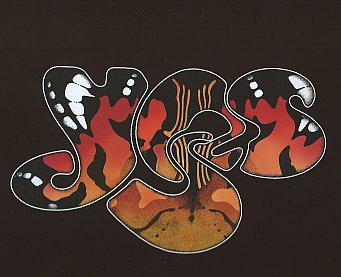
All that swept away by phlegm and bile, bondage-wrapped rage in three minute songs.
Well, the uncomfortable truth is it didn't exactly happen like the wiping clean of a palimpsest.
Prog might have been wounded by punk, but there was never a death blow.
Emerson, Lake and Palmer had actually reached the end of their lifespan when punk broke, King Crimson were on a smoko break when the Sex Pistols arrived but reformed in '80, enjoyed critically acclaimed albums and – aside from regular breathers so the various members could do other things – they have carried on various versions until today.
Jethro Tull barely stopped for breath even though the sales returns were smaller (inevitable given they'd released 10 albums before the Clash's debut), and if we consider Pink Floyd “prog” then they still had The Wall up their sleeves before Rogers Waters quit (and only now have flagged the idea). And from '80 onwards Genesis albums in that decade went to number one on the UK charts.
And for at least the past decade there has been a new wave of ambitious prog-rock bands (Porcupine Tree, Dream Theatre, Opeth, Transatlantic) and you don't see Marillion going away. They've been with us since '83, and Anathema since the early Nineties.
These days Steve Wilson (of Porcupine Tree) runs a parallel solo career and remasters albums for King Crimson, Robert Fripp and others, co-produces bands like Opeth and . . .
And although Yes might have taken a short hiatus in '81, by the following year a new Yes had formed and the band – albeit in yet another configuration of members -- is still with us today and earlier this year released their 21st studio album Heaven and Earth.
Their original singer Jon Anderson – whose voice I could never stand to be honest – has been replaced by his soundalike Jon Davison (so no respite for the likes of me) and when they played in Auckland in November it was to essay once again two of their classic albums, Fragile (1971) and Close to the Edge (72).
Before we get too cynical about that fan-pleasing set, it's worth noting in passing that the few punk bands which remain standing are not doing new material. If they are touring at all it is to play their old songs to fans of that era, former rebels now equally as stricken with nostalgia for their youth as original Yes fans who turn out for concerts like this.
Everywhere you look bands are “playing the album”, and that goes for The Pop Group as it does for Yes.
First, a Declaration of Uninterest in Yes.
Until fairly recently their only album in my possession was Tales From Topographic Oceans ('74) and I doubt I played it three times in as many decades. But, for academic rather than personal reasons, last year I explored their vast catalogue – well not all twentysomething albums, that would be madness – and lack of interest turned into mild curiosity. When sheer boredom didn't take over.
But when this concert was announced I became very interested. Close has just been voted the Greatest Prog Album Of All Time by the readers of Britain's Prog magazine. And Fragile came in 10th.
How could you not be interested in seeing those cornerstones played in their entirety. Or eternity, if you will? And anyway, I'd interviewed sole original member Chris Squire, the bassist, and he seemed a thoroughly pleasant chap.
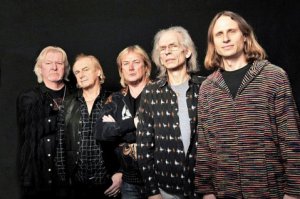 Before Yes
appeared on stage, images of a couple of dozen album covers, ticket stubs,
stadium crowds and the like appeared on the small screen. A fanfare
for these uncommon men who have well over a century of collective
experience as Yes. And yes, it looked like they had too.
Before Yes
appeared on stage, images of a couple of dozen album covers, ticket stubs,
stadium crowds and the like appeared on the small screen. A fanfare
for these uncommon men who have well over a century of collective
experience as Yes. And yes, it looked like they had too.
Judging by the number who leaped to their feet to applaud when they walked on, and again after a number of their lengthy passages, this wasn't a concert for those lacking interest or merely curious. This was a gathering of the faithful.
To the band's credit, it was an intelligently programmed set which opened with Close, an album that leads to a thoroughly rocking finale on Siberian Khatru after numerous sublime moments and some rather musicianly and dull passages between. Rather like what Rossini said about Wagner: lovely moments but all those boring quarter hours in between.
Yes-music is a bit ADHD in that it rarely rests in one place to long before going somewhere else – usually a solo which could easily be excised – and when vocal passages do return they suffer from awful repetition. Lyrical ideas are either stretched thin, or inanely mystical to the point of making no sense at all.
I'd like to set this as an assignment for decoding: “The time between the notes relates the colour to the scenes, a constant vogue of triumphs to dislocate man so it seems, and space between the focus shape ascend knowledge of love, as song and chance develop time, lost social temperance rules above”.
Answers on the deck of an aircraft carrier?
Still, no one ever argued you should go to a rock group – not even a prog-rock group – for any kind of metaphysical insight.
But that thrilling finale of Close served to set up two numbers from their new album Heaven and Earth by recently recruited singer Jon Davison who has a keen ear for an economic pop-rock song: Believe Again and The Game were terrific (they were coherent songs for a kick-off) and the latter even drew a grey-haired lady into the aisles for some interpretive dance moves.
Then it was down to Fragile business, an album from when they were more rock than prog and less consciously uncoupling from blues and hard rock.
The musicianship is never in dispute: founder/bassist Chris Squire holds down earth-shaking runs and rare singing tones; guitarist Steve Howe effortlessly shifts from driving chords to arpeggios repeated with minimalist perfection; keyboard player Geoff Downes commands a battery of black'n'whites for funky organ sounds or liturgical music (often within a few ADHD bars) and longtime drummer Alan White is an intense and accurate, if largely invisible, presence.
 Davison has a
similarly high voice to original vocalist Jon Anderson although more
dry in places and forcing a falsetto. It does seem rather effete,
which leads you to . . .
Davison has a
similarly high voice to original vocalist Jon Anderson although more
dry in places and forcing a falsetto. It does seem rather effete,
which leads you to . . .
Viewed from another perspective it was all faintly absurd too, if not downright hilarious.
Davison in striped pants repeatedly adopted a risen-Christ poses with arms stretched to heavens and seemed more like an actor in Godspell; there are faux-spiritual lyrics about sunrises, dreamers, mountains and rivers; Howe (who has Gandalf's hair) sometimes looked like a surprised mouse when pulling out blistering runs or deft solos of beautiful dexterity, and the psychedelic images and such on the small backdrop seemed like downsizing a cinema screen to a laptop.
It was also – aside from Davison's often inanely beaming and quasi-messianic presence – rather joyless and workmanlike.
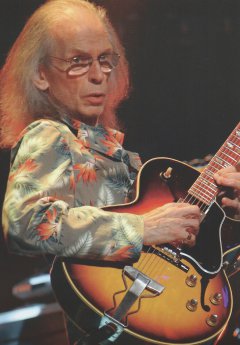 Squire did a funky
shuffle at one point which was like a geriatric white-folks attempt
at a very tired James Brown.
Squire did a funky
shuffle at one point which was like a geriatric white-folks attempt
at a very tired James Brown.
You wouldn't want a newcomer alien to stumble into a Yes show and try to glean something about popular culture.
And I was disturbed to see some irresponsible parents had taken children along.
But that view won't be shared by loyalists who got an increasingly exciting concert and responded in kind, many offering a standing ovation which the band thoroughly deserved.
And at the end of the encore – their pop-rock hits Your Move (71) and Owner of a Lonely Heart (83), actual proper songs again, saved as crowd-pleasers – I too leaped to my feet immediately.
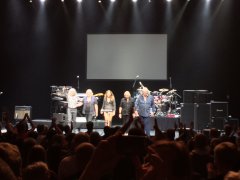
Last time they played in New Zealand, about two and half years ago, they commanded the Vector Arena and now they were at the Aotea Centre.
If the move had been the other way I'd be making the case for a new punk movement.
.

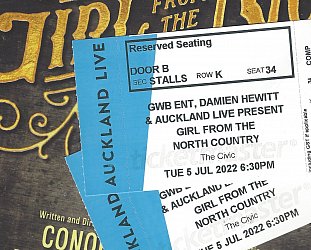
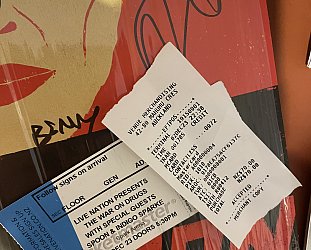
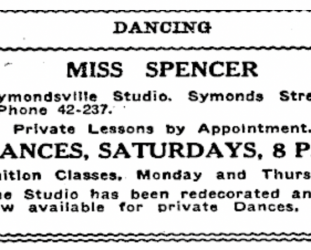
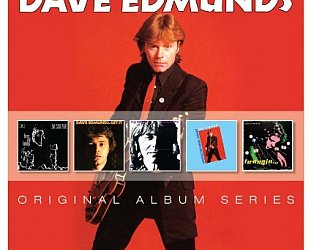
post a comment